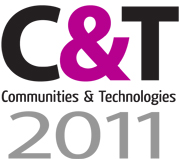ML10: Research for Action – Networking University and Community for Social Responsibility
A workshop in conjunction with Making Links 2010
Monday, 15 Nov 2010, Perth, Western Australia
www.makinglinks.org.au/news/research-for-action/
Workshop Theme
This workshop brings together people from a diverse range of disciplines to discuss how academic researchers and community practitioners and activists can work together to explore the use of information and communication technologies, social media, augmented reality, and other forms of network technologies for research and action in pursuit of social responsibility. The aim is to connect people with ideas, ideas with research projects, and harness new media to further inquiry into socially just outcomes in our community.
Douglas Schuler confirmed workshop keynote speaker
Will We Be Smart Enough Soon Enough? Putting Civic Intelligence into Practice
Civic intelligence names a phenomenon that takes place every day but is rarely recognized for what it is. It’s a manifestation of collective intelligence that is directed towards social and environmental progress. In short, it’s focused on attaining civic ends through civic means. Civic intelligence has particular relevance to people who are involved in education and work with the people in the real world. It helps describe examples as diverse as Evergreen State College’s Sustainable Prisons Project where prisoners are engaged in biology exploration, Seattle’s all-ages music venue, the Vera Project, and the Beehive Collective where art, popular education, and political action are creatively interwoven. Civic intelligence can help us determine the relative importance of projects and help us identify directions that are most likely to be relevant and fruitful in the design of projects. One of the most important tasks facing us is asserting — and of course demonstrating — the legitimacy and effectiveness of this orientation. And, of course, this task will require that we sharpen and employ our civic intelligence.
Biography
Douglas Schuler has been focusing on the intersection of society and technology for over 25 years. He has written and co-edited several books, including Participatory Design: Principles and Practices (Erlbaum, 1994), New Community Networks: Wired for Change (Addison-Wesley, 1996), and most recently, Liberating Voices: A Pattern Language for Communication Revolution (MIT Press, 2008), a multi-year undertaking (still in-work) with 85 contributors. He is president of the Public Sphere Project and former chair of Computer Professionals for Social Responsibility. For CPSR, Doug organized the Directions and Implications of Advanced Computing symposia series which was first convened in 1987. He is also a co-founder of the Seattle Community Network, a free, public access computer network supporting community and civic engagement that first went online in 1994. He is a member of the Faculty at The Evergreen State College in Olympia, Washington, a non-traditional liberal arts college, where he teaches programs that focus on the idea of civic intelligence. Doug has a masters degree in computer science (University of Washington) and a masters in software engineering (Seattle University). He is working on his PhD.
Participation
There are two ways in which you can participate in this workshop. You can either come along as a general participant, including having the chance to present a short position statement on your current research needs, projects or ideas (whether as a researcher or active practitioner), or you can present a paper (full length papers to be selected on the basis of peer review). Workshop costs AU$ 85 if you also register for Making Links 2010, or AU$ 145 if you only attend the workshop. Morning/afternoon tea breaks and lunch included.
If you would like to attend this workshop, you can still register!
A. General participation stream
Position Statements: We are calling for 300-500 word position statements expressing the interest in the workshop and the disciplinary background of the participant.
06 Sep 2010 Submission of short position statements by email to the workshop chairs
30 Sep 2010 Notification of acceptance (early-bird rate closes 1 Oct 2010)
B. Peer reviewed publication stream
Full papers for peer review and publication in a special issue of the Journal of Community Informatics: http://www.ci-journal.net/index.php/ciej/about/submissions#onlineSubmissions
06 Sep 2010 Submission of full papers for peer review by email to the workshop chairs
30 Sep 2010 Notification of acceptance (early-bird rate closes 1 Oct 2010)
01 Nov 2010 Revised, camera ready papers due
We will issue a wider call for journal articles to be submitted for peer review to this special issue of the Journal of Community Informatics after the workshop. Workshop delegates are invited to submit revised, full length articles at that time, too.
Workshop Chairs
Professor Matthew Allen (@netcrit), Internet Studies, Curtin University of Technology
m.allen AT curtin.edu.au
Associate Professor Marcus Foth (@sunday9pm), Urban Informatics, Queensland University of Technology
m.foth AT qut.edu.au


